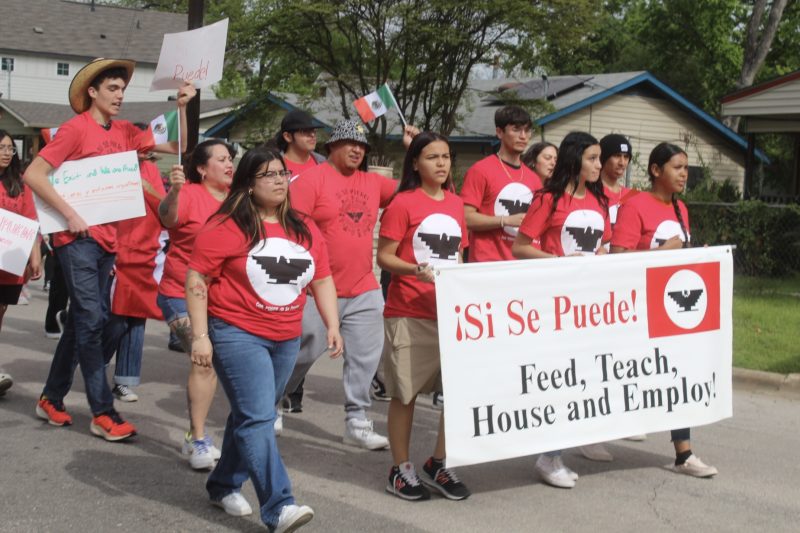Leaders Focus on Legislative Challenges During César Chávez Day Celebration
By Anissa Sanchez
Reporting Texas

Members from PODER march in remembrance for César Chávez’s legacy. Anissa Sanchez/Reporting Texas
Chanting “sí se puede” and holding small Mexican flags, several dozen people marched through East Austin on Saturday to celebrate the legacy of Mexican-American labor leader César Chávez and to highlight present-day challenges for Latino civil rights.
Susana Almanza, director of PODER, an environmental justice organization, helped organize the event, which has taken place around Chávez’s birthday every year since 2001, eight years after Chávez’s death.
“To me, honoring that and not forgetting that struggle is so important,” Almanza said, “especially for the next generation that never got to meet César Chávez.”
During a series of speeches before the march, Latino leaders decried two recent laws by the Legislature: Senate Bill 4, which enables local and state law enforcement to arrest people suspected of crossing the border illegally, and Senate Bill 17, which bans diversity, equity and inclusion offices at public colleges and prohibits mandatory diversity training for students or employees.
State Rep. Maria Luisa Flores, D-Austin, denounced SB 4 as discriminatory and a measure that would increase racial profiling by law enforcement.
“It gives law enforcement a blank check to arrest anyone they suspect of being in this country illegally,” she said. “While many understand the value of diverse communities that make up a state, not all do.”
In December 2023, Gov, Greg Abbott signed SB 4, saying at the time that the law “will help stop the tidal wave of illegal entry into Texas, add funding to expand the border wall and crack down on human smuggling.”
Austin City Council Member José “Chito” Vela said the law will create a “negative atmosphere” for Latinos in Texas.
“We have to return to basic dignity and respect to working-class people, in particular the immigrants that do so much for our country,” Vela said. “Those are the folks that César Chávez fought for, that the Chicano civil rights movement fought for, and those are the folks that I wanna bring out of the shadows and empower.”
SB 4 has been temporarily blocked as the 5th U.S. Circuit Court of Appeals considers whether the measure violates the U.S. Constitution.
Abbott signed SB 17 into law in June 2023. At the time, the measure’s author, Sen. Brandon Creighton, R-Conroe, called it “the most significant ban on diversity, equity and inclusion (DEI) in higher education in the nation.”
“With this bold, forward-thinking legislation to eliminate DEI programs, Texas is leading the nation and ensuring our campuses return to focusing on the strength of diversity and promoting a merit-based approach where individuals are judged on their qualifications, skills and contributions,” Creighton said in a press release.
Flores told the marchers at Austin’s Parque Zaragoza that SB 17 is another attempt to marginalize racial and ethnic minorities.
“These (DEI) programs didn’t give minorities any advantages,” Flores told the crowd. “They simply were efforts at inclusion and designed to level the playing field that our ancestors fought for decades ago.”
Paul Saldaña, who runs a public relations firm and was the chief of staff for the first elected Latino Mayor of Austin, Gus Garcia, said that holding the celebration in Parque Zaragoza is significant. It was one of the first public places in the city where Mexican-Americans were allowed to congregate in public, Saldaña said.
“There’s been an effort over the last several years to redevelop and bring back Latino community events to Parque Zaragoza,” he said.
Several speakers, including Susana Carranza, a voting rights activist and retired chemical engineer, urged young attendees to get involved in local elections.
“If you look at the map of Travis County, there is a pretty sharp divide on the color of the voter turnout map,” Carranza said. “Anything east of I-35 is lower turnout than anything west of I-35, and that reflects demographics.”
Dolores Huerta, who co-founded the United Farm Workers labor union with Chávez, told the crowd that their presence gives her hope.
“Chávez’s civil rights were cultural rights, the rights of a colonized people to self-determination and self-empowerment,” Huerta said. “I think all of us can continue his legacy for fighting for not just workers, but for everyone that has experienced injustices.”